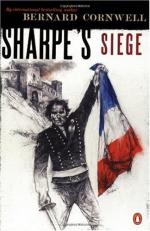
|
| Name: _________________________ | Period: ___________________ |
This test consists of 5 short answer questions, 10 short essay questions, and 1 (of 3) essay topics.
Short Answer Questions
1. What do Sharpe and Frederickson think about their situation at Teste de Buch?
2. What type of supplies did Sharpe's men carry when marching overland?
3. What does de Maquerre do when he sees Sharpe?
4. What does Sharpe do after they cross the Leyre River?
5. What type of man is the man who meets Duco?
Short Essay Questions
1. What does Calvet argue and how does Ducos respond and why does he respond that way?
2. What does Sharpe and his men ambush?
3. What does Killick do with the British prisoners?
4. What type of tactic has Sharpe used to get his men out of the fort? Describe how it worked.
5. What finally sets up a French assault for the next day?
6. What does colonel Favier ask Sharpe and what is his reply?
7. Describe Pierre Ducos and describe his unusual status.
8. What does Bampfylde do before leaving Teste de Buch?
9. Who joins Sharpe and why?
10. What kind of fighting method does Sharpe have his men do?
Essay Topics
Write an essay for ONE of the following topics:
Essay Topic 1
In Chapter 9, the meeting between de Maquerre and Ducos heavily foreshadows future developments. Discuss the following:
1. Define the literary term "foreshadow."
2. What is foreshadowed by the meeting between de Maquerre and Ducos? What are other instances of foreshadowing in the book? What purpose do you think it serves that the author chooses to give "hints" of things to come?
3. Are there times when something seems to be foreshadowed in Sharpe's Siege, but it does not play out in the manner hinted at? Why do you think the author chooses to lead the readers astray? How do you react when something happens in the book of which there is no hint whatsoever earlier? Do readers like to "prepare" themselves for future action in a book? Do you feel "cheated" when a major character whom you have come to enjoy immensely dies or is killed suddenly with no hint that it is going to happen? Why or why not?
Essay Topic 2
Cornwell is masterful in his description of battles and life in general in for a soldier during the Napoleonic Wars in the early 1820s. Discuss one of the following:
1. Trace and analyze Cornwells's descriptive passages about life as a soldier. How does he use descriptions of the five senses to make the reader feel s/he is there? Do you find his descriptions compelling? Seemingly accurate? How would the novel be different if Cornwell did not include such descriptive passages?
2. Analyze Cornwells's descriptive passages about the social structure of the times and discuss what you think it would be like to be a person of wealth and/or privilege such as Captain William Bampfyldem, Comte de Maquerre, General Calvet, and Commandant Henri Lassan. Contrast that to the lives of those who are in a lower social strata such as Sharpe and Harper or one in service to someone of wealth and/or privilege.
3. Describe and analyze Cornwell's descriptive passages about the topographical setting and the physical descriptions of the people. Does Cornwell do an adequate job of actually making the reader "see" the land/sea where the action is taking place? How about getting a visual image of the characters? How does the descriptions of the setting add to the novel? Do you like having an idea of how a character looks? How would the novel be different without such descriptions?
Essay Topic 3
In any book centered around the military, leadership of the troops is often crucial with the better leaders able to command the respect and loyalty of their men. The men's willingness to follow a particularly leader can have a decisive impact upon the success of a mission. Discuss the following:
1. Whose command style seems most effective? Analyze the elements of those effective leaders thoroughly and discuss the traits of the good leaders. What makes an excellent leader or commander? Give examples.
2. Whose command style seems most ineffective? Analyze the elements of those ineffective leaders thoroughly and discuss the traits of the poor leaders. What makes a poor leader or commander? Give examples.
3. Is disobeying a poor leader ever justifiable? Explain using details from the text, other books you have read and your personal experience. In times of war, disobeying an order can be punishable by death. Is this harsh sentence justifiable for such an act? Why or why not.
|
This section contains 1,231 words (approx. 5 pages at 300 words per page) |

|




